#Olivia Reviews!
Explore tagged Tumblr posts
Text
absolutely fucking reeling from puss in boots the last wish. my grown ass friends made me see it and it absolutely fucked. it was mad max fury road for kids. it was a horror movie about the fear of death. it was a western about an ageing outlaw trying to regain his youth with the help of his ex fiance and homeless harvey guillen. it was about found family. it was about needing people and asking for help. it had the best depiction of a panic attack i've ever seen in a mainstream film. the villain looked exactly like boris johnson. there was a wicker man reference. it had a kill count higher than most slasher films. it set up shrek 5. they even said fuck.
#puss in boots#puss in boots the last wish#pibtlw#pib the last wish#pib#puss in boots: the last wish#antonio banderas#harvey guillen#salma hayek#florence pugh#olivia colman#ray winstone#samson kayo#boris Johnson#shrek#shrek cinematic universe#movie review
44K notes
·
View notes
Text
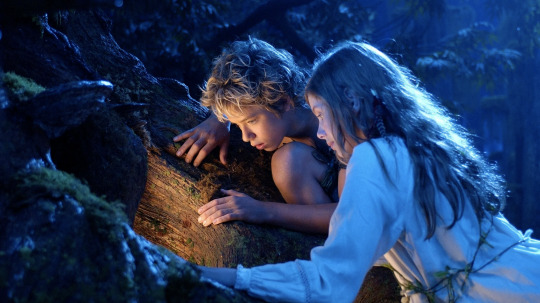
P.J.Hogan's 'Peter Pan' is still an underrated masterpiece 20 years later
Peter Pan is a live-action fantasy adventure film directed by P. J. Hogan that reimagines the classic story of Peter and Wendy. The screenplay was written by P. J. Hogan and Michael Goldenberg and was released in cinemas in December 2003. The screenplay is based on the 1904 play Peter Pan, or The Boy Who Wouldn’t Grow Upand the classic novel Peter Pan by J.M.Barrie, which was originally published under the title Peter and Wendy.
The film tells the story of a young Edwardian girl, Wendy Darling (Rachel Hurd-Wood) and her two younger brothers John and Michael. On the night she is told she must grow up, a wild, fairy-like boy called Peter Pan (Jeremy Sumpter) flies into her room with his high-maintenance fairy Tinkerbell. When he learns that she tells stories, he whisks Wendy and her two brothers away to a magical Island called Neverland — where you supposedly don’t “grow up” — so that she can mother his henchmen, the Lost Boys. There she fights pirates led by the evil Captain Hook (Jason Isaacs), meets mermaids, dances with fairies, falls in love and grows up.

I have strong family connections tied to Peter and Wendy and J.M.Barrie. My great, great uncle Nico was one of the sons of Sylvia Llewelyn Davies'. He and his other brothers "the Lost Boys" were adopted by J.M.Barrie; which ultimately inspired him to write Peter Pan. Nico’s daughter Laura — my cousin — who I met for the first time a few years ago, told me that she was flown to Australia for the filming of P.J. Hogan’s Peter Pan because she was J.M.Barrie’s goddaughter. She told me that she was thrilled with the cast, especially Jason Isaacs, who played Captain Hook and Mr Darling. She also mentioned that Jeremy Sumpter, who played Peter Pan, was a lovely boy. However, she said she was very surprised and sad that the film wasn’t a big success as she really liked what they did with the story. I have loved the fairytale of Peter Pan from a young age, and learning that I am literally part of the family that inspired the story was very exciting and I’ve only begun to internalise it more as I’ve grown older.
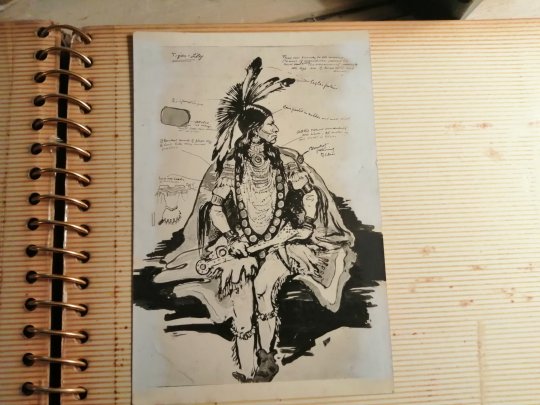
When I was in my mid-twenties, I was diagnosed with a high level of Autism. One of my main symptoms was labelled “ageless”, which in simple terms means that one half of me is still a child that I can’t mentally leave behind. I can’t do many things that most adults can do, such as pay bills, drive a car, look after my own well being etc. I flap my hands when I get excited. I bounce. I sometimes speak in a baby voice. I overcommit to things I enjoy. I admit that it was hard to come to terms with the diagnosis when I first received it. But over time, I’ve come to believe that the two can coexist in a healthy way. I believe that I am an adult who is able to develop and grow while still carrying the child within me, and that this is not seen as a bad thing. I think Peter and Wendy can be seen as a reflection of that.

I was first introduced to P.J. Hogan’s Peter Pan a few years after it was released (I was maybe nine or ten years old), and I absolutely loved it. It wasn’t only one of my favourite film adaptations, but one of my favourite movies of all time. What surprised me most about the film at that age was how dark and gruesome it was, and full of this underlying sexual tension that I hadn’t expected at all from Peter Pan. Even today, this film still has a special place in my heart. It is made with so much passion and love for the original text that I can automatically put myself back into the story. After watching the film again as an adult, I almost immediately opened my copy of Peter and Wendy and started reading. I would even go so far as to say that I prefer the film to the book. However, part of me wishes that the age rating had been set much higher, as the dark and gruesome moments were some of the strongest parts of the film adaptation. This is possibly why some critics and viewers had difficulty categorising the film at the time.
However, I often consider P.J.Hogan’s Peter Pan to be the same equivalent as Joe Wright’s Pride and Prejudice. (which came out a few years later in 2005, starring Keira Knightley and Matthew Macfadyen). The film moves at the same dreamlike pace. It is light, dark, colourful and deeply romantic.

I also often prefer P.J.Hogan’s Peter Pan to the 1953 Disney Animation of the same name, even though it’s the version I grew up with and liked. I find it much less straightforward and innocent. Also, the 2003 film is much closer to the original source material, which I loved reading as a teenager, and to J.M.Barrie’s original vision. The film manages to reflect the same intellectual subtext and depth of the novel while retaining the whimsy and magic.
Magical Realism

Peter Pan was a perfect blend of fantasy and realism. A lot of media these days focus too much on “realism” and make their sets and CGI look bland and washed out. It’s a common myth these days that no one likes whimsy anymore; it’s somehow seen as too childish. As a result, much of the magic of fantasy is lost. But in this Peter Pan, a lot of colour was used in the set design and cinematography. Everything was so brightly and colourfully lit. Most fantasy films these days, including the new live-action adaptation of Peter Pan and Wendy on Disney+, are all so gloomy and dark. You almost have to light up the screen to make out the actors’ facial expressions or what’s happening in the scene. But this film understands that a viewer who watches fantasy wants to be swept away, but also wants a certain amount of believability. Although the film contained a good amount of darkness, it did not shy away from being cartoonish either (which I think was partly inspired by the Disney animation), i.e. characters blushing or bouncing on the clouds.
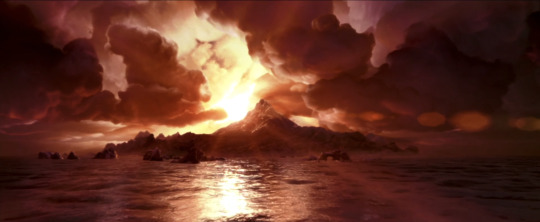
The design of Neverland was breathtaking. I think the CGI, although criticised by some, made the island and creatures look more dreamy and fairytale-like. It was a good combination of CGI for the landscapes and real backdrops for the jungle, so there was enough magic and believability to transport the viewer into the story. A bright colour palette was used for the landscapes, while down-to-earth colours such as browns and greens were used on the ground, such as in “The Lost Boys Hide” under the tree, to give a sense of realism. The costume department also reflected this, from the majestic reds and blacks of the pirates, to the earthly colours of blue and red for the Native Americans, to the natural greens and browns of the Lost boys. I noticed that the colours in Neverland were used as a contrast to the Edwardian London back home, which is realistic but dull compared to the island.
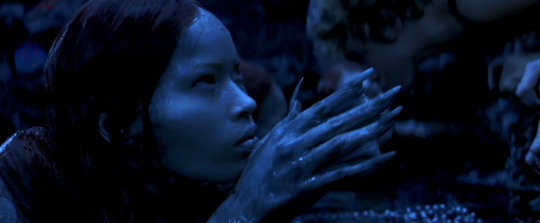
One aspect I liked was that the lighting on Neverland always changed depending on the mood of the scene- unlike the naturalistic lighting on Earth. It was almost as if the island was a living being. For example, when there was a fight on the ship, the lighting was red. When Peter took Wendy to the mermaids, who were scary and frightening, the lighting was dark and blue. This created a surrealistic atmosphere, almost like a fever dream or a kind of nightmare.
Sometimes the environment changed depending on Peter Pan’s mood in the respective scene. I particularly liked how Peter Pan influenced the weather on Neverland. Just his mere presence when he flew to the island changed the entire atmosphere in an instant. His feelings also determined whether it was summer or winter. In other words, its suggested in the film that the longer he has been there, the more the island has become a part of him, so that he can no longer leave it. It’s almost as if the island has transformed him into a magical being.

The exuberant musical score by James Newton Howard: I’ll never forget that. I think that was one of the first movies I saw where I actively noticed the music because it was so brilliant. Even today, the “Flying” soundtrack still gives me goosebumps. It perfectly encapsulates the whimsy, joy and imagination of Peter and Wendy. I loved that there were always different variations. One of my favourite pieces from the movie is ‘Fairy Dance’, which starts off cheerfully and moves up and down depending on the characters’ conflict/what they’re saying in the scene.
Cast
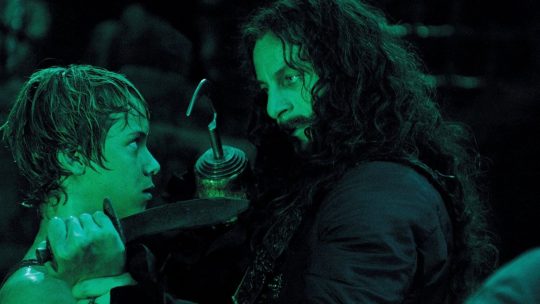
The cast of this film adaptation was magnificent. The look of all the actors not only matched the book description, but also the mood, especially with the Darling family. One of the standouts was Olivia Williams as Mrs Darling. She captured the gentleness of the character perfectly. I also loved the new addition of Aunt Millicent, played by Lynn Redgrave. She fitted into the story so well that I was surprised not to find her in the novel. She had the perfect amount of ridiculousness and hilarity that suited J.M.Barrie’s style.
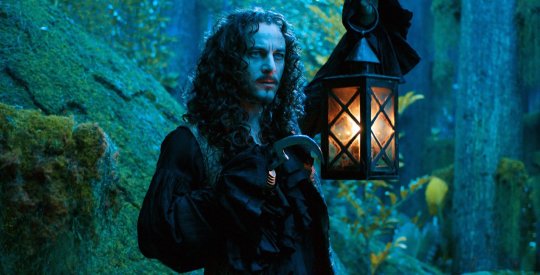
One particular member of the cast we can probably all agree on that was perfect, was Jason Isaacs, who played both Wendy’s father Mr Darling and Captain Hook. He was certainly a star in this film for sure. I just can not think of anyone who could play him better, especially in a live-action film adaptation. He was particularly good in the role of Captain Hook. When I first saw the film as a child, I did not know that Captain Hook and Mr Darling were played by the same person until my dad pointed it out to me because he was so good. I loved how they portrayed Wendy’s dad as shy and reserved, as opposed to Captain Hook who was flamboyant and sinister. Mirror versions of each other in different realities — that’s a common theme throughout the film. As Captain Hook, Jason Isaacs perfectly captured the essence of viciousness, deviousness and brutality that was necessary for the character. But also the deep loneliness and frustration behind it all. I have seen a quote that was supposedly cut from the film (and never should have been) that provides so much context for his hatred of Peter Pan:
“Imagine a lion in a cage and into that cage flies a butterfly. If the lion was free, it would pay no heed to such creature. But the lion is not free…and so the butterfly drives him slowly insane.” — Captain Hook
They did a really good job of showing how Peter Pan and Captain Hook are mirror images of each other. Peter Pan is a child who secretly wants to be an adult, while Captain Hook is an adult who secretly wants to be a child. Both fight each other for different reasons, but the goal is the same. For example, there is a great scene towards the end where Captain Hook uses his wits to defeat Peter in a fight. Here it becomes clear that there is deep symbolism for the inevitability of adulthood and the loss of childhood. Jason Isaacs really showed off his acting talent here. I liked that he wasn’t portrayed as a “dumb villain”, which he easily could have been.
There were also some great performances among the adults. Most notable was Richard Briers as the ‘pirate’’ Smee. But the child actors, especially the lost boys, really held the movie together. Their solid performances made it so believable that the island was ruled by children. I loved Theodore Chester as Slightly. He was very charming and funny in that role.
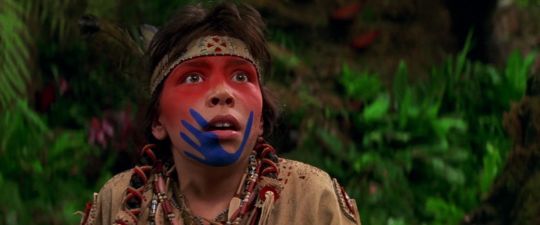
Another member of the cast I thought was brilliant was Carsen Grey, an indigenous actress of Haida descent, who played Princess Tiger Lily. I liked that they let her speak her ancestral language, Mohican, in this film. Although this film came out in the early 2000s, it is the only version of Peter and Wendy in which Native Americans are neither erased nor white-washed even though the representation is far from great. Considering how they’re treated in the novel, it’s perhaps for the best overall that they limited some of their scenes. However, I liked how firey she was in this adaptation and not the damsel in distress she was portrayed as in the Disney animation. I think it was a wise decision to cut the infatuation she had with Peter Pan, as it was really just one line in the book that would have added unnecessary drama, and all in all, it would have fallen short if all the female characters were jealous of each other.
They also downplayed Tinkerbell’s jealousy in this regard, portraying it more as her trying to protect Peter Pan’s youth from romantic advances, as hinted at in the novel, and also being sad that Wendy is attracting all of Peter Pan’s attention. Ludivine Sagnier has, in my opinion, succeeded well in making Tinkerbell equally repulsive and endearing, as befits the character.
Wendy Darling
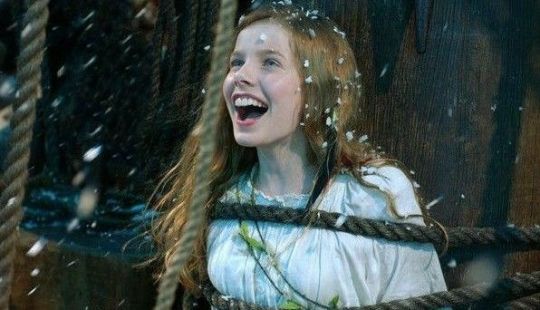
Rachel Hurd-Wood was the perfect cast for the role of Wendy Darling.I was actually surprised to learn that this was her first film role ever, because she was a natural. She effortlessly possessed the same caring nature and charm that makes Wendy so endearing. She is exactly how I imagine the character when I read the story. When people talk about Peter and Wendy, they always mention Tinkerbell, Pan or Hook, but personally I am always drawn to Wendy. She is the real heroine of the story. After all, she was the main reason for Peter to bring her and her brothers to Neverland.
What always amazes me about Wendy’s role in the story is the fact that Wendy literally doesn’t spend much time being a “child” in the time she spends in Neverland. When she’s not escaping death at the hands of mermaids or pirates, she acts as a mother to the ‘lost boys’ and her brothers. She asks herself what she really wants from life. In comparison, she was allowed to behave more like a child at home in Edwardian London. Neverland is not a place where you never grow up. It’s the place where she chooses to grow up. Many people have described Neverland as a manifestation of Wendy’s subconscious as a result of trauma, and I’ve never found that to be more true in this adaptation.
One of the reasons why I think P.J. Hogan’s Peter Pan is the best adaptation of the novel is the fact that the film revolves around Wendy’s coming of age. I loved that they expanded on her love of storytelling and also gave her a tomboyish streak. Instead of just being on the sidelines, she’s able to get involved and fight pirates while retaining many of her feminine traits such as her maternal instincts and romantic feelings for Peter. She makes mistakes and sometimes gets dragged into things she knows she shouldn’t do. But in the end, she triumphs.
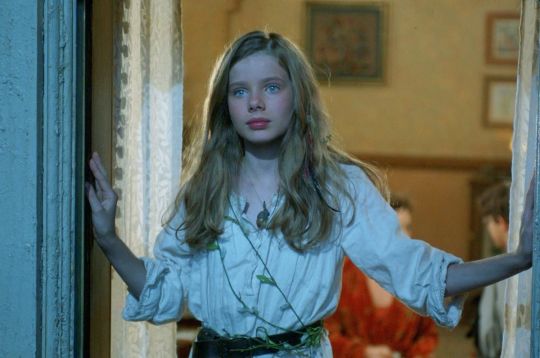
In many film adaptations of Peter and Wendy that I have seen, Wendy is either only present in passing or not at all. Characters like Peter Pan, Captain Hook and Tinkerbell always take centre stage, which I think is a strange decision as they are part of Wendy’s story and not the other way around. Peter Pan is meant to metaphorically represent the childhood she does not want to give up (which is why the character is always played by a woman in the original play, as he is a mirror image of Wendy). And Captain Hook (J.M.Barrie also wanted him to be played by the same actor as Mr Darling) represents the dark side of her father, or rather what she imagines adulthood to be. This is particularly emphasised in this film adaptation because he is an important factor in her being told to grow up. The father, the concept of adulthood, and Peter Pan, her childhood, are at constant war with each other.
“You’re not supposed to be like Peter, who kept every good and bad aspect of being a child and can’t tell right from wrong. You’re not supposed to be Hook, either. He let go of everything childish and loving about him and became bitter and evil..You’re supposed to fall in the middle, to hold onto the things about childhood that make it beautiful — the wonder, the imagination, the innocence — while still growing up and learning morality and responsibility. You’re not supposed to be Hook. You’re not supposed to be Peter Pan. You’re supposed to be Wendy Darling.” — @maybe-this-time
The 2023 film Peter Pan and Wendy took a different approach, by making Wendy a kind of powerhouse who always saved the day and outshone Peter Pan overall. In my opinion, the 2003 film adaptation emphasised very well that Wendy really is the yin and yang. She's allowed to be romantic, be rescued by others and at the same time determine her own destiny and stand up for herself. Because that’s what her journey in the adaptation is all about. She is pressured by all the adults in her life to grow up. She allows herself to be seduced with the prospect of an eternal childhood by Peter Pan. Then she realises that it is not self-fulfilling. She is tempted by Captain Hook with the concept of adulthood. And finally, she finds a balance between these two extremes on her own terms. By the end of the film, Wendy has made her peace with growing up while still remaining a child at heart. That requires a certain mental strength that we should all strive for.
Peter Pan and Wendy Darling
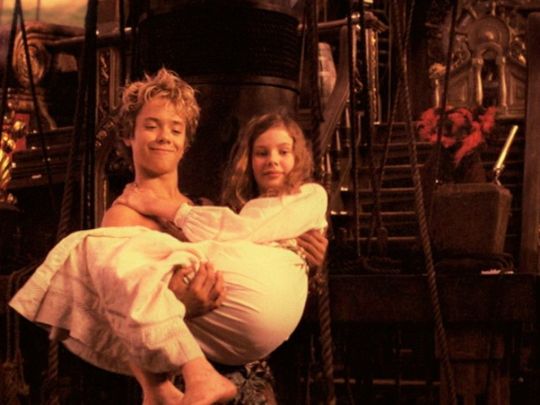
In most adaptations of Peter and Wendy, such as Hook and Syfy’s Neverland, the focus is on the title character Peter. In the more recent film adaptation Peter Pan and Wendy, the focus is on Wendy. This film adaptation of Peter and Wendy, on the other hand, sticks more closely to the original source material, as the story focuses on Peter and Wendy’s relationship. This is perhaps the reason why I always hesitate when I watch other adaptations, because these two characters are supposed to go together. It’s definitely a relationship that can be portrayed in all sorts of ways because they are symbolically the same person.
Although there is no romance between Peter and Wendy in either the original novel or the play, Wendy quickly develops romantic feelings for Peter which, as a prepubescent child, he does not consciously reciprocate as he has no concept of love other than that of a mother’s. Although Peter cares deeply for her, he ultimately only longs for her to be the maternal figure that is missing in his life. One could go into the symbolism that Peter and Wendy are one and the same, and that this is an expression of Wendy learning to love herself. But in a literal sense, J.M.Barrie had unintentionally created this very strong potential between the two characters. And I personally feel if your'e going to make an adaptation of Peter and Wendy that potential needs to be explored in some way, even if it’s not necessarily romantic.
Hogan recognised this potential and developed the romantic elements, e.g. ‘the “thimble” from the novel, into a very real and tangible plot. In other adaptations, Peter and Wendy’s relationship is rather one-sided. But in P.J. Hogan’s film adaptation, however, it is not at all. Over the course of the film, Peter and Wendy fall deeply in love with each other.
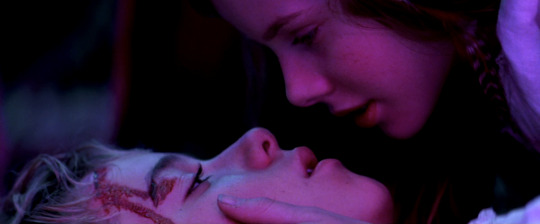
Rachel Hurd-Wood and Jeremy Sumpter had a remarkable on-screen chemistry for young actors, which helped give the adaptation its own identity. Whenever they interacted on screen as Peter and Wendy, it was — like the glittering pixie dust of Tinkerbell — simply magical. The off-screen chemistry between the two definitely helped make the romance so believable as well. When I was younger, I didn’t like romantic subplots in family films. I personally found that they clogged up the main plot because the “romance” tended to be very one-dimensional- but Peter and Wendy in the 2003 film version were simply enchanting.
In the original novel, J.M.Barrie alludes to the possibility of a romance between the two. In the film adaptation, they go all out. Their love story was written so beautifully and profoundly, while staying true to the original text and J.M.Barrie’s themes. This made the conflict hinted at in the novel of “staying in Neverland with Peter or growing up on Earth with Wendy” even more poignant and relevant, because in reality there was only ever one option. They couldn’t find a way to have both. That made the ending even more “heartbreaking” for me as a child, because even though they had the chance to be happy together, she couldn’t give up on growing up to stay. And he couldn’t give up being a child to leave, even though it was a natural progression for him.
Peter Pan
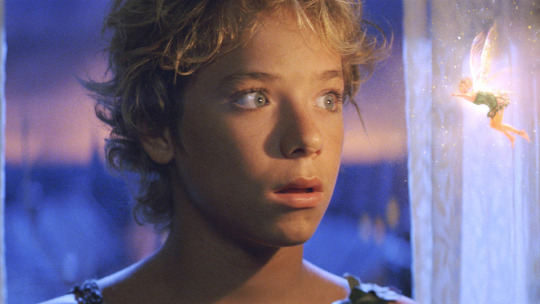
Jeremy Sumpter delivered a fantastic performance as Peter Pan. Not only did he perfectly match the illustrations, but he also managed to perfectly capture the essence of the charismatic, mischievous little boy from the novel. What’s more, of all the versions I have seen so far, he is by far the most accurate, right down to the clothes made of skeleton leaves, the dirty fingernails, the feral mannerisms, the traumatised soul behind the charm and the downright creepy insinuations. By today’s standards, you could almost take Peter Pan for a grown man who consciously decides not to behave like this.
However, when I watch the film again as an adult, I can now understand why he has reservations about growing up in Edwardian England and would rather remain a “child” in Neverland forever. As Peter says in the film, “Would they send me to school? And then to an office?” I feel like most of us today have so many choices as we get older, but back then it was much more limited. The choices were very restricted in that “heterosexist” environment. You could only be a certain thing, and it was much harder to hold on to the pleasures of life. I can now also understand the initial reactions of Michael and John to Peter: He must have seemed scandalous to people at the time. His bright colours, his inappropriate clothing and his behaviour are repulsive to the boys, but Wendy is immediately fascinated and attracted. I think it was a deliberate choice that he is the only character with an American accent to set him apart from the rest of the cast; to emphasise the wildness of the character and his non-conformity to the people of Edwardian London.
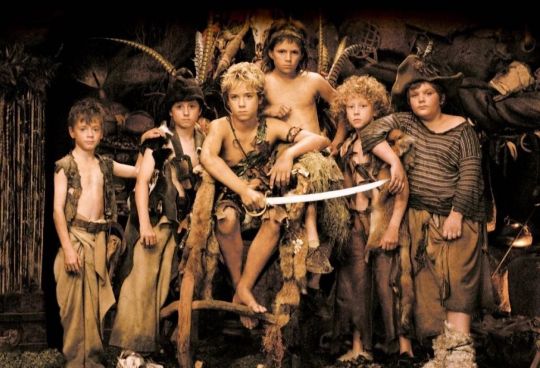
Another small aspect I liked was the suggestion that the Lost Boys, although they lived with Peter and obeyed his commands, lived in constant fear of him and did not worship him as in other adaptations. (A fear that is justified as Peter tries to kill them more than once in the film). What the 2003 film adaptation captured perfectly about Peter's character was: how terrible of a person he really is. Peter Pan is a hero when he goes on adventures and fights pirates. You could argue — via the quote “Leave Hook to me” (which Peter says to her in the film) — that Peter is Wendy’s split self who can fight her father (Captain Hook) for her, just like antibodies do with germs when we can’t handle them ourselves.
However, when it comes to understanding emotions, caring about others, even his henchmen, the Lost Boys, and doing anything that inconveniences him, Peter Pan is possibly as bad as Captain Hook. This makes Wendy’s decision to leave him all the more powerful. Although she was initially seduced by his adventurous life, she soon realises that his “life” of joy and adventure is not fulfilling at all. Because in reality, there is no real joy. There is no real adventure. In reality, his life is empty because it is not earned. In addition, she realises that she is gradually losing her memory of the outside world, including her parents - a sign that she is “slowly awakening from the dream”. This leads Wendy to realise that she wants more than what he can give her in Neverland (e.g. romantic love) and decides to leave. Being alive means feeling, accepting and growing. However, as long as Peter remains a boy, he can never truly be alive. Peter Pan conveyed this important message, whereas earlier film adaptations, including the Disney animation, did not.
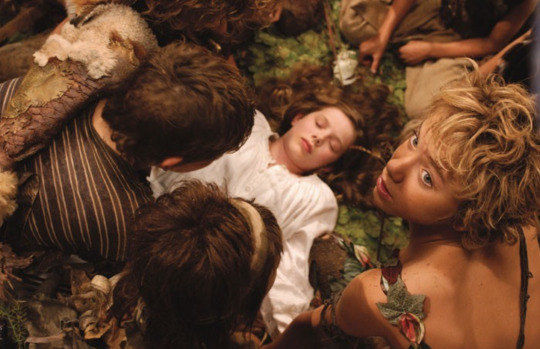
One of the reasons why good adaptations of Peter and Wendy are so hard to come by, especially in this day and age, is not only because they adapt a performative story that exists in layers of subtext. They also work with a protagonist who doesn’t change. Who doesn’t develop in any way, neither negatively nor positively. Not even just physically, but also mentally. (Even Eli from Let the Right One In, the child vampire, changes in the course of the story). At the end of day, Peter Pan is ultimately there to serve someone else’s story. It works in a fairy tale format. But it doesn’t usually translate very well to the screen because it often leads to one-dimensional storytelling. Even if it seems so natural, it doesn’t come naturally.
However, this adaptation allows Peter Pan to grow. The writers expanded on the small aspect from the book, which is the moment when Wendy enters Peter’s life; he begins to feel emotions. Not just love. But anger. Fear. Sadness. Pain. Disgust. And above all: self-awareness. Almost like a version of puberty in condensed time, as if the change suddenly caught up with his body. When Wendy brings this up, Peter immediately rejects it out of fear. I think most of us can all relate to this when we were in the midst of growing into a young adult. We experience feelings that are scary and new, that we can’t yet fully understand or even want to. For Peter Pan, falling in love is exactly what he is afraid of: growing up and no longer being a child. This adds to an interesting conflict that arises between the two when she asks him to leave with her.
“The thing about Peter Pan is, he’s a coward. Had the chance of a lifetime and he bottled it. Just fucked off back to Neverland. All alone, forever he was, by his own hand. Poor old Wendy, she had to grow old without him.” — Skins, 6x07 “Alo”
In the original novel, the reason Wendy can’t take Peter Pan with her (apart from the fact that he refuses to grow up) is the same reason Lyra in His Dark Materials can’t take Pan — the animal manifestation of her soul — on the boat to the land of the dead. She has to split in order to grow up and leave a part of herself behind. She can’t keep both in order to move on. But that does not mean I always agree with the ending either. In which Peter remains a child and takes Wendy’s future descendants to Neverland and back to look after him. It leaves an icky aftertaste, but at least it fits in with the story J.M. Barrie wanted to tell.

Even though the adaptation conveys the same message, that Peter Pan is the manifestation of Wendy’s youth, even to the end. In this version of Peter Pan, that is no longer the case. By the end of the film, the way he holds himself is different. The way he looks wistfully through the open window and solemnly says, “To live would be an awfully big adventure,” : a sign of self-awareness, while Wendy happily reunites with her family. So much so that Tinkerbell has to pull him by the hair to stop him from joining them and reconsidering his decision. Peter is now old enough to know that he loves Wendy. Maybe he’s also mature enough to know what he’s missing, but he knows he can’t have her the way he wants, so he does the most selfless thing he’s ever done in the whole film by letting her go.
There is no such conflict at the end of the 1953 Disney animated film. Peter Pan is described by Wendy as “wonderful”. In reality, everyone else gets their happy ending, except him, because he deliberately chooses not to. Peter Pan very much turns himself into a tragic figure because he is afraid of the most natural thing in the world. He is afraid of life. And I feel like this version of the story knew that and expressed it strongly, which makes me conflicted now as an adult. I’ve seen endings like this before, where two people fall in love but do not end up together because they grow apart or they are both interested in different things, and it’s very important to reach those points in different ways. It very much reflects real life and is also reminiscent of first love. How that love never really fades. It reminds you of simple times, even when you’ve grown up and moved on. That a part of you is still at that age when you look back on it. These endings happen because people grow — which Peter Pan does not.
“Peter in the books lives in oblivious tragedy. He may suspect that he’s not fully happy, but he tends to forget about it… yet this Peter doesn’t… Wendy leaving him and growing up to be a wife of another man is his unhappy thought…It’s the loss of innocence since Peter could not forget this…It’s the process of growing up…all but confirms that Peter’s character arc in the film is one of accepting the fact he too must grow up to be happy.” — @rex-shadao
And I think that’s the real reason why his character is both the strongest and the weakest part of the adaptation. The writers didn’t make it clear enough that Peter Pan forgets in their version of the character. In the novel, Peter Pan forgets everything automatically, which is why he can exist in this limbo of childhood and not go mad. However, as mentioned earlier, this version of Peter Pan is old enough to remember and, more importantly, to feel. Even though he is the closest to J.M. Barrie’s original vision, unlike his counterpart in the book, he is capable of evolving. That’s why the ending sometimes feels strange to me as an adult.
It was hard to say why I had a strange feeling at first, but I realised that a lot of my mixed feelings stemmed from having seen the film adaptation fresh after reading the novel. Since Peter Pan fully reciprocates Wendy’s love in this version, he ends up being a different character than in the book, which is why I now disagree with them keeping the original ending instead of having him grow up with Wendy. It would symbolise that childhood can co-exist with adulthood, that you don’t have to leave a part of yourself behind. That you can be your true and complete self if you find the balance between the two extremes.
The original ending still works however, in all its bittersweetness. I know what it means and understand what it stands for. Wendy basically says goodbye to her childhood and promises never to forget it. There’s a reason it made such an impression on me when I was younger. It could just be because I’m trying to pick up all the pieces of my broken heart from the floor. But personally, as an adult, I just find it weaker compared to the novel. Sometimes I like to imagine an ending to this version of the story where Peter Pan comes back, having quickly realised that he has outgrown Neverland, but doesn’t meet Wendy again until they are both much older, at a time when Wendy is coming to terms with womanhood and the idea of marriage. Or she even meets his real earth counterpart (if we were to delve into the psychology of Neverland being Wendy’s dream). And their relationship is subjected to the natural test of time and growth.
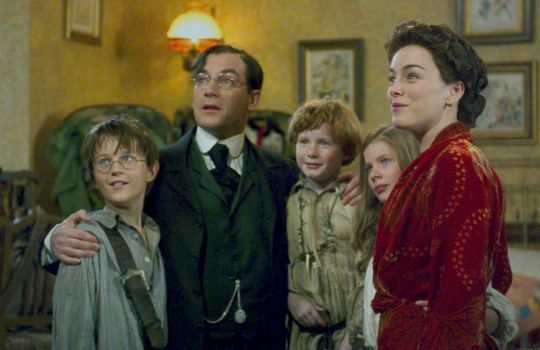
Peter Pan is an almost perfect adaptation. It matches the humour, the tone and the vision of J.M.Barrie. But I can certainly understand why the film didn’t do so well at the box office. In the month it was released, there was an unfair amount of competition, namely the film Lord of the Rings — The Return of the King. And as an adult, I can now understand why it’s not the film people think of or remember when it comes to Peter Pan adaptations. And it’s not just because it doesn’t fit the elfish, jolly trickster persona that Disney has created.
The film adaptation suffers more from what it doesn’t do — such as maintaining a stable tone and consistent editing — than from what it does. It’s one of those films that would have benefited from being much longer. That way, the inconsistent tone and some of the rushed parts of the adaptation would be much more balanced. It feels like it was missing an extra twenty minutes. For example, the film is narrated by an older version of Wendy, but without the deleted ending where it becomes properly clear that it’s her telling the story to tie everything together, the ending feels a little abrupt. Say what you will about Tim Burton’s adaptation of the Series of Unfortunate Events, but the audience could see where the film’s narration was coming from the whole time. I think if they knew the alternate ending wasn’t going to work (that scene is a classic example of something working well in the novel but not in the film), they should have removed the narrator altogether with the deleted ending and adjusted the film accordingly. They should have extended some scenes so that parts of the film weren’t rushed, such as the introduction, and the story would have been left more up to interpretation as there was no voiceover throughout.
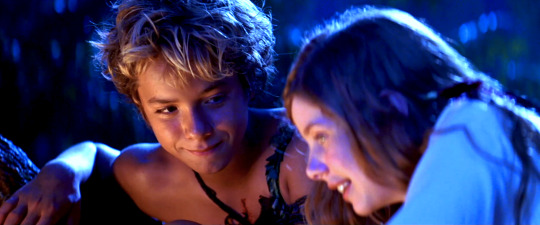
Despite its weaknesses, P.J.Hogan’s Peter Pan is still an underrated masterpiece 20 years later. It is an irresistible film that captivates and warms the heart. The film adaptation has certainly stood the test of time, staying true to the original while adding its own flavour to the story. It is full of magic, wonder and heart. It was clearly made by people who loved the origins of the story and explored where they came from, while also digging deep into the text to reshape the character arcs in a fresh and meaningful way. They succeed in capturing J.M.Barrie’s original message, which is that growing up is a natural progression of life, but that doesn’t mean leaving childhood behind entirely. That it is important to maintain a healthy balance between the two: Taking responsibility while appreciating the joys of life. From the vibrant colour palette to the goosebump-inducing music to the solid performances and gorgeous chemistry between Jeremy Sumpter and Rachel Hurd-Wood, my love for this adaptation will never end, no matter how old I am.
#peter pan#peter pan 2003#jason isaacs#jeremy sumpter#rachel hurd wood#peter and wendy#j.m barrie#peter x wendy#wendy darling#analysis#tinkerbell#captain hook#disney#peter pan and wendy#disney +#hook#James Newton Howard#olivia williams#novel#classic literature#filmmaking#film#cinema#culture#movie review#darling pan#finding neverland#film review#peter pan (2003)#peter pan live action
385 notes
·
View notes
Text

Thanks to the publisher for providing me with an ARC in exchange for an honest review
✩🐉✨Review:
A strong start to a romantasy series with endless potential!
“Fear the Flames” follows Elowen Atarah, an exiled princess, as she teams up with Cayden Veles, the feared Commander of Vareveth, to free her dragons and save her people. As forces beyond their control try to keep them apart, the pull between Elowen and Cayden becomes irresistible.
The concept of this book immediately grasped my attention. It was the reluctant allies-to-lovers romance that drew me in further! Elowen and Cayden’s knife to the throat meet-cute put me in a chokehold and I was living for their banter. Their dynamic is truly incredible and the tension had my heart pounding.
Unfortunately, the pacing and aspects of the writing are what lost me. While Cayden fell first, he also fell very fast. Many readers might like this if they prefer instantaneous chemistry, but I tend to like books where the relationship development moves more slowly, so I did not enjoy how quick it felt. Much of their dialogue, aside from the banter, was also clunky and cringey at times.
As far as the plot, the heist was the main focus, so I was a bit let down when it missed the mark. There was a lot of build-up surrounding it only for it to be done and over with so quickly. Nearly everything was executed perfectly without a hitch, so it just ended up being anticlimactic.
Overall, I appreciate this book’s vision and really liked some of its elements despite its setbacks. I’m interested to see what direction Darling takes the next book now that the groundwork has been laid.
Cross-posted to: Instagram | Amazon | Goodreads | StoryGraph
#fear the flames#olivia rose darling#elowen atarah#cayden veles#allies to lovers#forbidden romance#forbidden love#found family#one bed trope#there's only one bed#adult fantasy#adult romance#morally grey characters#royal romance#fantasy romance#romantasy#romance books#booklr#book blog#book blogger#bookish#book review#bibliophile#book rec#bookworm#bookaholic#book recommendations#spicy romance#spicy books
44 notes
·
View notes
Photo

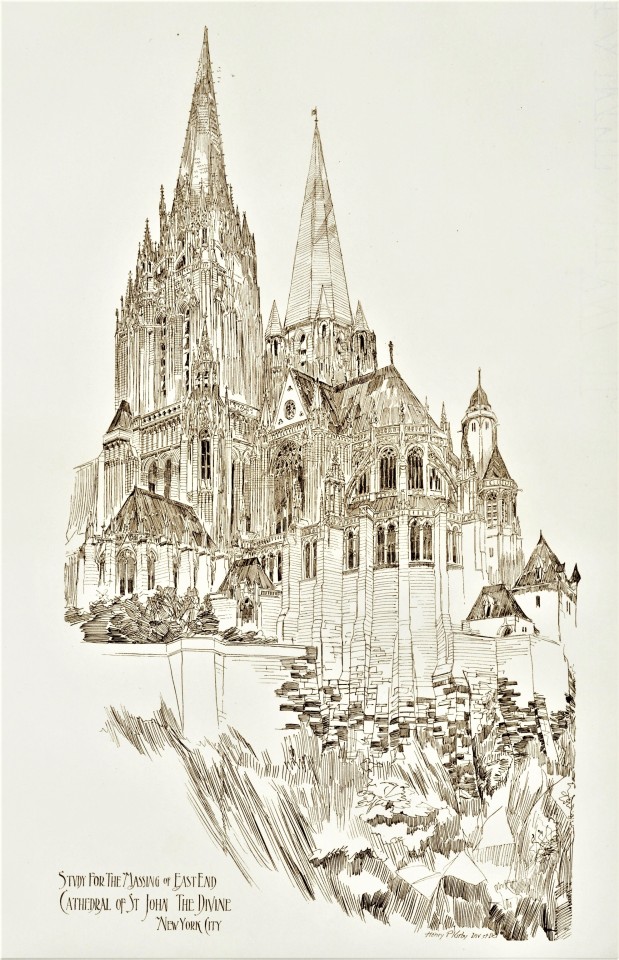
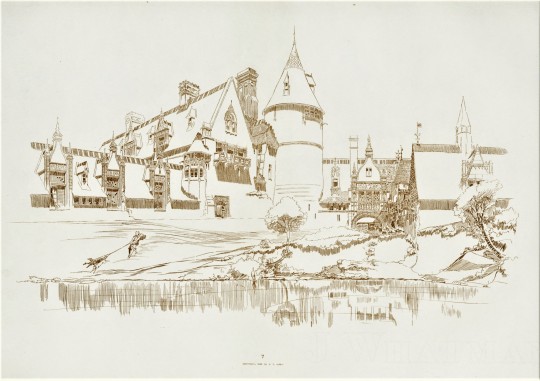
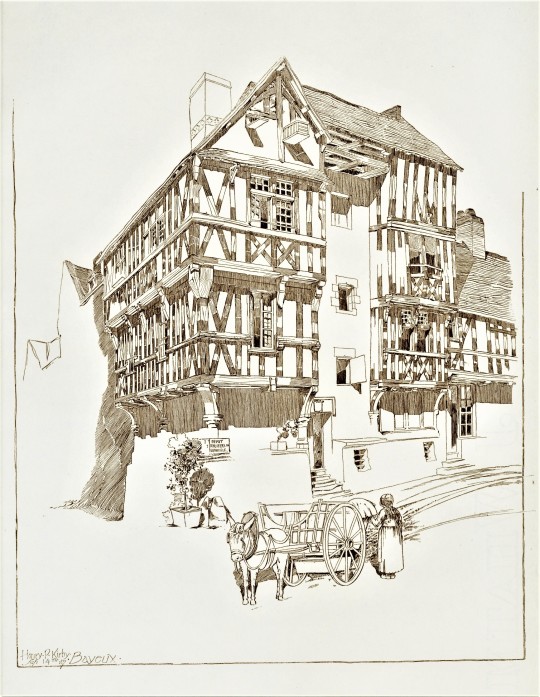



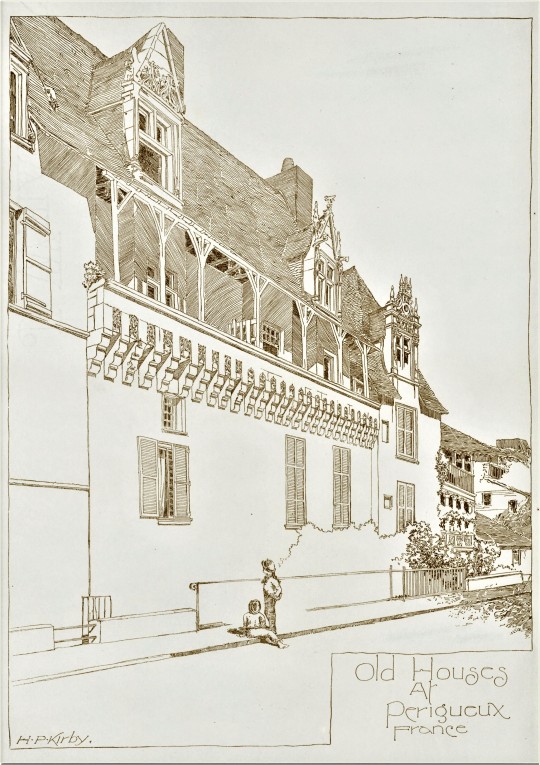
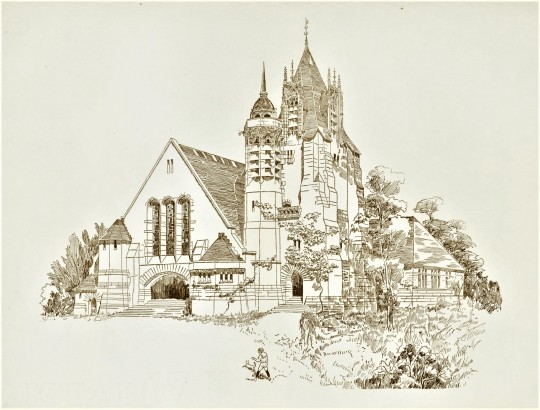
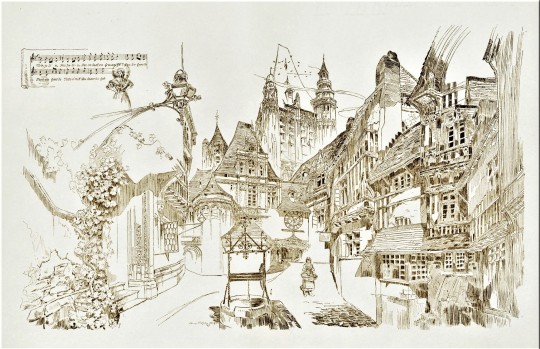
Decorative Sunday with Henry P. Kirby
These charming sketches are the work of New York architect Henry P. Kirby (1853 - 1915). Architectural Compositions contains fifty loose plates printed on Whatman paper and housed in a portfolio. It was published in Boston in 1892 by Bates, Kimball & Guild, publishers of one of the United State’s leading architectural journals of that time, The Architectural Review (Boston), not to be confused with the longer running Architectural Review still in publication out of London.
Kirby would have been working as a draftsman for George B. Post at the time of publication, for whom he later worked as lead designer before striking out on his own. Some of the subject matter also evokes Kirby’s time in France, where he studied at the École des Beaux-Arts after training with his father, also an architect. Per the subtitle, some of the sketches were “made in connection with actual projects,” while many were “the result of study during leisure moments.” I found Kirby’s eye for the human elements in his sketches particularly endearing, from the foreground figures to details on the buildings themselves, like open widows and overgrown foliage, or what looks like a duvet cover hanging out to dry (first image above).
For any music buffs reading, the final sketch includes some bars of "Très-jolie" from the opéra comique smash hit La Fille de Madame Angot.
Our copy of Architectural Compositions was gifted to UWM by Gustav A. Elgeti in 1966.
Find more Decorative Sunday posts here.
-Olivia, Special Collections Graduate Intern
#Decorative Sunday#Architectural Compositions#Henry P. Kirby#Henry Petit & Green#Bates Kimball & Guild#The Architectural Review#George B. Post#École des Beaux-Arts#La Fille de Madame Angot#decorative plates#decorative arts#beaux-arts#architecture#architectural drawings#architectural plates#olivia
433 notes
·
View notes
Text

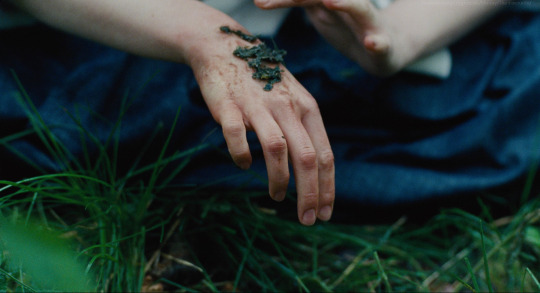
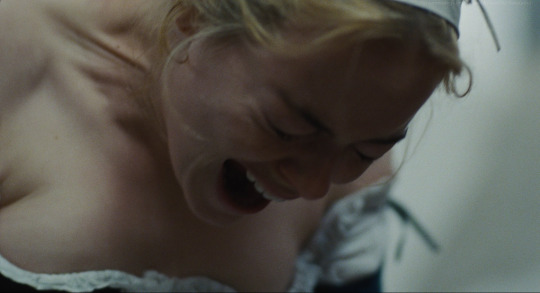

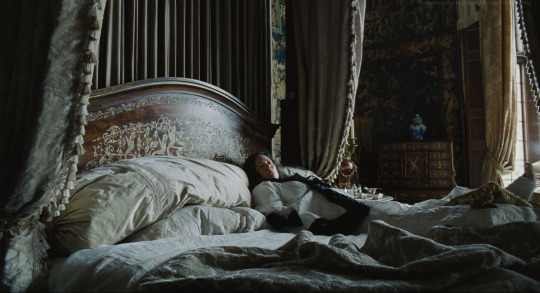
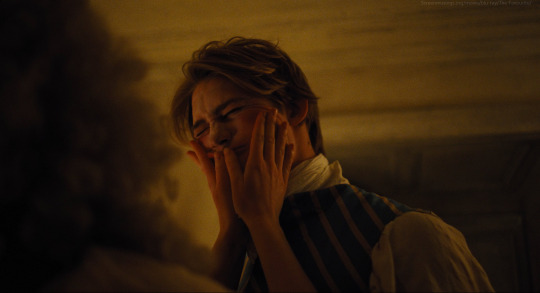
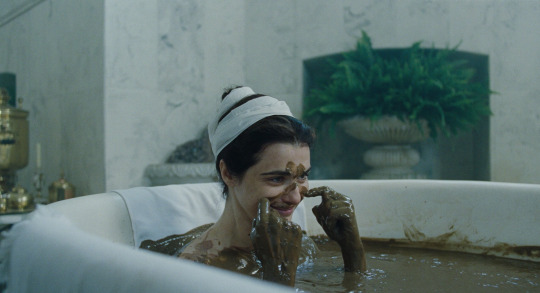
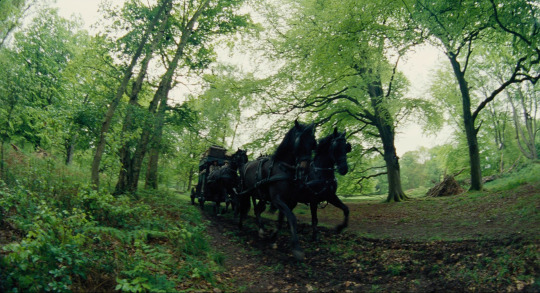
a film a day.
‘the favourite’ (2018), dir. yorgos lanthimos
letterboxd rating: ✭ ✭ ✭ ✭ ½
#a film a day#yorgos lanthimos#the favourite#emma stone#film#films#movies#film frames#screencaps#cinema#movie screencaps#cinematography#film stills#movie review#olivia colman#film is not dead
202 notes
·
View notes
Text
youtube
Recently watched Mech Cadets and I've gotta say, I had a great time.
#video#mech cadets#netflix#review#youtube#olivia park#aidan park#general park#adam williams#stanford yu#maya sanchez#frank olivetti#character writing#complex characters#it's probably a sign of something that I'm posting this and the barbie video#on my socials on the same day#because I just completely forgot to post the barbie video anywhere after it went up#Youtube
77 notes
·
View notes
Text
Wonka (2023)
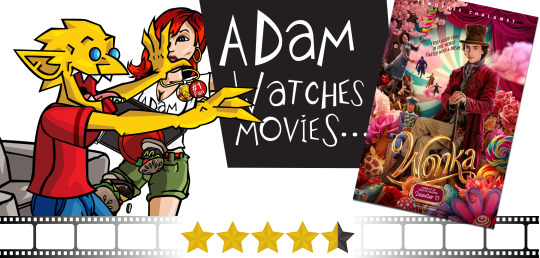
Wonka practically steps onto the stage and declares itself a new favorite. When the film was announced, it was met with skepticism. We’ve already had two adaptations of Roald Dahl’s Charlie and the Chocolate Factory. Going back to see how the book’s most memorable character became who he is felt like a desperate attempt to cram more chocolate down an already-filled stomach. Here’s what the naysayers should’ve paid attention to, however: writer/director Paul King. I know you loved Paddington and its sequel, Paddington 2. Everything that made those films great – except for the titular bear – is present here, along with catchy musical numbers. This is a lovingly assembled film the whole family will eat up.
After an extended journey around the world gathering the rarest ingredients and learning everything there is to know about sweets, Willy Wonka (Timothée Chalamet) dreams of establishing his own chocolate shop. Unfortunately, his initial trip to the Galéries Gourmet sees him pushed out by the “Chocolate Cartel”. Shortly after, he’s swindled out of his savings and forced into indentured servitude by Mrs. Scrubbit (Olivia Colman) and her co-worker, Bleacher (Tom Davis). He’ll be doing laundry for the next twenty-five years unless he can settle his debts. The only way to do that is to become the chocolatier he's always dreamed of becoming.
Wonka has been called a “companion piece” to 1971’s Willy Wonka and the Chocolate Factory but come on. It's a prequel. Two songs are reprised/expanded upon, several visual cues are ported over and Chalamet’s portrayal of the titular character is reminiscent of Gene Wilder’s. If you were to watch the films back-to-back, however, you would spot certain inconsistencies. Some, there’s no way you could’ve worked around, such as the character Hugh Grant plays. I won’t spoil what his part in the film is (even though he is on the poster) but if you were to watch this movie before the original, he would give away one of the latter’s biggest surprises. There’s also an aspect of Wonka’s character that’s a bit off. I personally think people label WW&tCF as being much darker and scarier than it is but you can understand why people would call it frightening, or "a gateway to children’s horror". This film has no cynicism or darkness in it whatsoever. It’s one of the reasons why it works so well but if this film is indeed a prequel, that's an inconsistency.
With those minor complaints out of the way, let’s talk about the many ways Wonka succeeds. First, the cast and tone. There are many villains in this movie. Keegan-Michael Key plays the corrupt, chocolate-addicted Chief-of-Police. Paterson Joseph is Arthur Slugworth, the leader of the Chocolate Cartel. He, along with his cohorts Gerald Prodnose (Matt Lucas) and Felix Fickelgruber (Mathew Baynton) are not above sending innocent people to be enslaved or even murdered. Then, there’s the extended Cartel, which includes a small, but funny role for Rowan Atkinson. Finally, the combo of Mrs. Scrubitt's & Bleacher. On paper, these characters are quite sinister - even children are being enslaved by Scrubitt and Bleacher. Despite that, you kind of… like them. They're all delightfully ridiculous and quirky. You can tell the performers are having a blast hamming it up – in the best way. They’re all evil. They all love being evil. You love seeing them do their thing.
Nearly everyone we meet is more eccentric than anyone in real life could ever be - including the other "inmates" at Scrubbit's boarding house (played by Jim Carter, Natasha Rothwell, Rich Fulcher and Rakhee Thakrar), except for the friend Wonka makes once all his money is stolen: an orphan named Noodle (Calah Lane). She’s in a worse spot than anyone else, which makes her apprehensive and cynical but also most receptive to the idea of hope once Wonka gets going. You can bet that by the end, all of the heroes will have played an important part in the story, even if their skills seem to make them kind of useless. Seeing how they fit in the big picture is part of the fun.
Between the big laughs and musical numbers, we get scenes of magic and wonder - the kind you can only in worlds where people spontaneously burst into dance. There's something so earnest about Wonka. It knows exactly what it wants to be and isn't afraid of going for it. Paul King takes single gags and turns them into characters for the sake of a big punchline at the end. You can tell from the way the story flows that's going to be the case and there's almost a sense of suspense as you wonder what's going to happen with that. Wonka pokies fun at itself more than once but is willing to be serious when the scene calls for it. That's what makes it, why it's a great prequel to Willy Wonka and the Chocolate Factory.
Wonka is the kind of movie I wish we’d see more often. You think back to the movies you used to see as a child and it feels like we used to get ones like this all the time but actually, we didn't. Movies like this one are rare, it's just that they're so much fun you never forget them and they get passed down from generation to generation so it feels like there's this large library you had before and haven't been able to add to. Push away any apprehension you might've had initially and you'll see. Wonka fits in with those childhood favorites. (November 22, 2024)

#wonka#movies#films#movie reviews#film reviews#Paul King#Roald Dahl#timothee chalamet#Calah Lane#Keegan-Michael Key#Paterson Joseph#Matt Luicas#Mathew Baynton#Sally Hawkins#Rowan Atkinson#Jim Carter#Natasha Rothwell#Tom Davis#Olivia Colman#Hugh Grant#2023 movies#2023 films#Willy Wonka and the Chocolate Factory#Charlie and the Chocolate Factory
14 notes
·
View notes
Text
2024 Art In Review


Here's my 2024 art in review! ...Don't worry about what happened in March and August.
#art in review#art summary#my art#my drawing#ibispaint#kirby oc#Olympea#Olivia oc#nana kirby oc#olympea hoy
12 notes
·
View notes
Text
I'm binging Scandal for the first time, currently on season 2. Took me a minute to figure out genre. Now, it's one of my top 5 telenovella, solid 9/10! The sobering bittersweet chemistrified toecurling romance bits keep you hooked and tolerant to show's overall goofiness, stupidity and overacting. Shonda watched way too many soap opera, thank God for that!
#scandal#olitz#star crossed lovers#shonda rhimes#olivia pope#bridgerton#faves#show review#kerry washington#tony goldwyn#political satire
41 notes
·
View notes
Text

Olivia Wilde - Eu queria ter a sua vida - 2011
19 notes
·
View notes
Text

Seeking Mavis Beacon (dir. Jazmin Jones) x DOXA 2024. (via The Independent)
Two women investigate the disappearance of the iconic real-life model behind the popular 1980s educational software while raising pertinent issues concerning our relationship to technology. Jones and her friend, Carribean-American video artist Olivia McKayla Ross, create their own portrait of their image of "Mavis Beacon" while blending the facts they uncover with their own fictional interpretations. Their exercise feels like an experimental detour interrogating our cultural fascinations (like true crime or conspiratorial fare) as they figure out who Renee L’Esperance, a Haitian immigrant model, perfume saleswoman, and the face behind Mavis Beacon Teaches Typing, really is and why she vanished from public life entirely.
Screening as part of the 2024 DOXA Documentary Film Festival at The Cinematheque on May 12.
#saving mavis beacon#mavis beacon#events#documentay review#jazmin jones#documentary#media#doxa#reviews#features#movie#olivia mckayla ross#movies#movie review#film#renee lesperance#renee l'esperance#film review#documentary review#cinema#seeking mavis beacon#typing
37 notes
·
View notes
Text

So I've just finished watching Season 1 of "Hemlock Grove".
I rate it as 6 out of 10.
None of the main characters was relatable, no character development, random sexual scenes all the time, violence (also sexual violence) and above all – nothing made sense at all.
I've never seen a show with werewolves but without vampires. The "creativity" was to have a kind of an alien that feeds on blood. Seriously, why not just using vampires?
The only character which was well written was the mother, Olivia.
Bill (Roman Godfrey) has so many sex scenes with random girls, showing feminine nudity - but he is never naked. You can tell just by that he doesn’t feel comfortable, and yet it keeps happening.
#hemlock grove#roman godfrey#olivia godfrey#the sims 4#ts4#sims 4#thesims4#sims4#ts4 celebrity#sims 4 celebrity#bill skarsgård#sim: bill skarsgård#bill skarsgard x reader#bill skarsgard fanfiction#bill skarsgard imagine#hemlock grove review#sims celebrity#sims 4 male#ts4 male sim
32 notes
·
View notes
Text

serious philosophical question; should one of us kick the bucket?
small comic page thingy for the INSANE fic that is zelotypia by @terrence-silver - i definitely recommend giving it a read! so much interesting perspective on that ponytail-kreese-twig trio goodness; and terry’s inner workings and detestment for everyone that john loves more than him!
#cobra kai#terry silver#john kreese#cobra husbands#ponytail#doodles#cw blood#lovely lovely fic. one of those fics where you HAVE to read aloud to process it halfway thru because it’s soo deliciously twisted#i found myself giggling at moments bc in essence he really is just an angry teenage girl undergoing the crazy DO I WANT HIM…#…OR DO I WANT TO BE HIM dilemma while he scribbles in his little fluffy pink journal with a glitter pen#oh twiggy terry… do i have the ALBUM FOR YOU.#[i whip out guts olivia rodrigo and he swats me into a pit of snakes.]#anyways this probably wasnt the fic to be giggling about but it was a taddy bit relatable in a SENSE…?#count this tag ramble as my little review when i say I REALLY ENJOYED IT!#love when people write terry as the sick little jealous bugger he is!#ive seen it with betsy and lawrence… NEVER WITH PT THOUGH! AND THAT IS GONNA KEEP ME UP ALL NIGHT!
17 notes
·
View notes
Text


Fond Farewells Mark the End of an Era for The Crown.
Pt 2 of Season 6 Accedes to the Next Generation – But Reigns Most Triumphant Saluting Its Sovereign.
Review & gifs by L.L @The Crown TV
I wasn't sure what to expect from the final 6 preview episodes of The Crown. Part 1 gifted us with a season-defining performance from Elizabeth Debicki, but such intense focus on the tragedy of Diana and Dodi's deaths was heavy-going. How to move forward?
Not many TV shows stick the landing, but I believe The Crown does, mostly by putting Queen Elizabeth front and centre. In four different ways! But Part 2 takes a while to forge ahead and reign triumphant.
Ed McVey and Meg Bellamy make shy William and swotty Kate believable as a young couple who meet at university – or earlier, as per a flashback with (not Ghost!) Diana. I still found it hard to invest in their will-they-won't-they relationship (we already know they do.)
Instead, it’s sisters Elizabeth and Margaret who have long been the emotional heart of this show; at every stage of their lives.
Former Oscar-nominee Lesley Manville (alongside Queen Imelda Staunton) is truly magnificent in Ep 8 as Princess Margaret, though it's painful watching this vibrant lady struggle as her health worsens.
Memories of the 1940's are a delight. However, I wish we'd seen more of wide-eyed teen Lilibet let loose (Viola Prettejohn) and carefree Marg (Beau Gadsdon) before older Margaret says her final goodbye.
Staunton saves her best for last, bringing dry humour, vulnerability as well as leadership to Ep 10. The 70+ min epic finale 'Sleep, Dearie Sleep' has its shaky moments, but beautifully completes Queen Elizabeth's story when it counts, bringing near-perfect closure. That alone elevates Season 6 beyond Season 5.
Warning - MAJOR SPOILERS AHEAD. This is my final *EVER* review (might be extra long!)
S6 is NOW ON NETFLIX - WATCH THE EPISODES before reading.
Images: courtesy of Netflix
Starting with less good news; the first couple of episodes of Part 2 were my least favourite. Ep 5, 'Willsmania', feels transitional, and a little stuck in the past. Following his mother's death, Prince William (Ed McVey; taking over from younger actor Rufus Kampa) turns inward as he struggles to cope with public attention and grief.
It's an understandable reaction to losing a parent, but Part 1 already spent nearly half a season on Dodi and Diana. It felt like we grieved in real time. As a result, whenever the subject of Diana crops up again in Part 2, it tends to weigh down both pace and narrative.
Ep 6 brings a welcome change of topic. This being The Crown, I'm sure there are critics poised to be offended by Queen Elizabeth's nightmare about Prime Minister Tony Blair being crowned king, but to me, his 'coronation' was hilarious, as was the choir boy singing Blair's cheesy Labour pop anthem.
It felt like deliberate tongue-in-cheek humour, an absurd reminder why monarchy might still be better than populist elected leaders.
I really wanted this episode to work, but it didn't go anywhere, and themes like tradition-vs-modernity were covered more effectively in episodes such as 'Marionettes.' Bertie Carvel has Tony Blair's voice down but suffers from comparisons with Michael Sheen, who was uncanny as the Prime Minister in 3 earlier Peter Morgan projects.
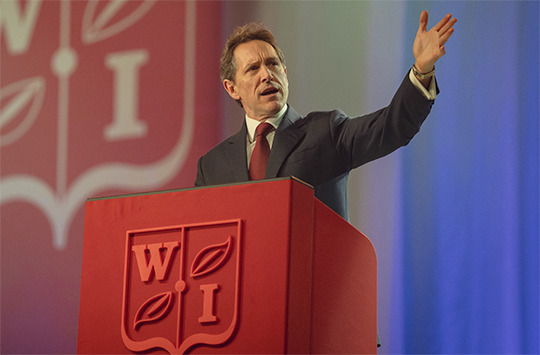
^ PM Tony Blair. The Women's Institute weren't fans of his grandstanding.
The Crown: The Next Generation fully arrives during Ep's 7, 9 & 10. Some will love it. Those who prefer more historical episodes with broader scope may be disappointed, as the show follows William and Kate through University life in the early 2000's.
The newcomers do bring fresh energy to the show. It helps that they cast Ed McVey and Meg Bellamy, who make a sweet couple as Will and Kate, even if William sometimes comes across as petulant.
Unlike Ed McVey as William, Luther Ford doesn't bear much physical resemblance to Prince Harry, other than red hair. Ford does however put in a good performance as Harry becomes increasingly reckless.
The Crown doesn't hide either Harry or William's bad behaviour. The brothers seem to get on well at the start, but it later seems like they're more at odds. Underneath a lot – a LOT – of boozing, both boys appear quietly screwed-up over their mother's death. Neither of them seem to enjoy playing happy families with Charles, either.
The show mostly concentrates on William and Kate, but there aren't many episodes left to develop a genuine romance. They have potential, but it feels fairly surface level. Suddenly, they rush to move into a house share together when we've barely seen them kiss. They (and we) needed more screen time to really get to know each other.
There's a bigger issue here with Kate's mother, Carole Middleton (Eve Best.) Pushy parent Carole is keen to play matchmaker between her 'commoner' daughter and the young eligible Prince, keeping tabs on William. Carole isn't as conniving, but ... didn't we just watch a similar storyline with Mohamed Al-Fayed/Dodi/Diana in Part 1?
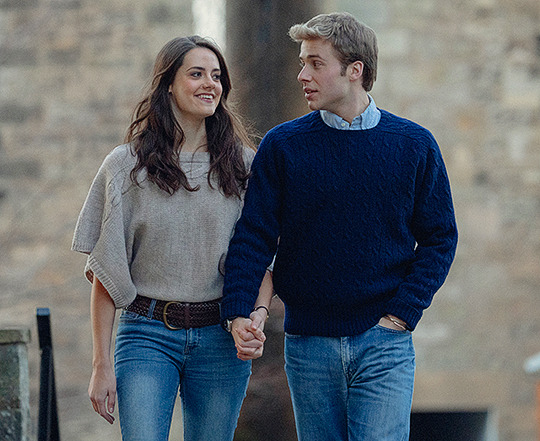
^ Kate 'n' Will. Her Mum would frame this picture.
Ep 8 'Ritz' plays like a standalone film. Margaret's final story is touching, but upsetting, at times; I was a fan of Diana, yet sobbed as much for Margaret as the credits rolled, even though her eventual death isn't shown. In fact, her final goodbye is sensitively done and stands as a fitting tribute to the princess, as well as to the Queen.
Lesley Manville makes Margaret's predicament so real as her health slowly breaks down. She bounces back from one stroke, then another hits. How awful too for Elizabeth to watch a much-loved sister deteriorate, though it was wonderful to see Lilibet read Margaret a bedtime story. It brought out the warmer side of Staunton's Queen.
The scene where Margaret scalds her feet in the bath is genuinely horrifying. I've suffered from ill health and loss of control myself and this was so much worse. I could feel her pain. That poor woman.
Human moments are where The Crown excels; through this episode, this working-class lass from a council house could somehow relate to a Princess in a palace. Peter Morgan has surely done more to humanise the royal family than any P.R team ever could.
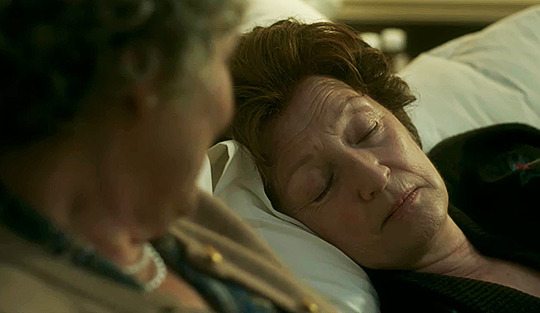
^ Fans of Margaret (and Lesley Manville) prepare yourselves for her sad final journey.
Onto the big reveal: when I mentioned at the start there are FOUR ways Queen Elizabeth appears – this is what I meant:-
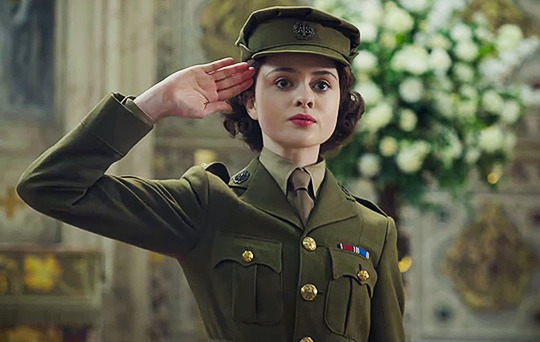
^ Newcomer Viola Prettejohn plays teenage Princess Elizabeth.
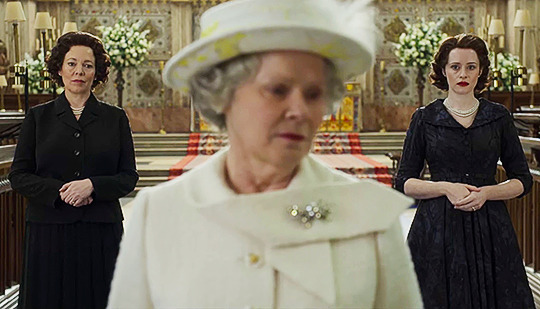
^ & there's Olivia Colman & Claire Foy alongside older Queen Imelda Staunton.
Satisfyingly, all 3 of The Crown's leading ladies return to close the show. Olivia Colman and Claire Foy each have an additional scene, too (I won't spoil the entire finale, as it covers a lot of ground in over 70 mins, but Olivia and Claire aren't back as 'ghosts.')
As we get older, the ghosts who speak loudest are our own; the former versions of us we berate ourselves with. Not everyone may warm to the Queen (sort of) talking to herself, but personally, I was thrilled to see these talented actors on screen together.
Foy's scene with Staunton is particularly effective, as the younger Queen gives her older self an old-fashioned dutiful talking to. It's somehow also credible that they're aspects of the same person.
It reminded me of Peter Morgan’s 2013 (extraordinary) play, ‘The Audience', which inspired this series, and included scenes where Helen Mirren shared the stage with young Elizabeth. That play is also why this theatre-fan started watching The Crown to begin with, and later went on to create this website.
When Ep 10 finished playing, my Netflix returned itself to Season 1. 60 episodes over 7 years! I will miss the grand scale of The Crown, but appreciate the legacy which remains. Now feels like the right time for this story to end. A full-circle moment in more ways than one.
**Majestic thanks for reading, and to every person who has liked, reblogged, messaged, supported The Crown TV for all these years.
💎♕You each deserve a Crown of your own!♕💎**
N.B: These are my humble opinions at this point in time. No offence is intended. Agreement = lovely; not compulsory. Disagreement = happens; kindly coexist. Ta!
#the crown#queen elizabeth ii#imelda staunton#princess margaret#lesley manville#tony blair#bertie carvel#william and kate#ed mcvey#meg bellamy#viola prettejohn#claire foy#olivia colman#reviews#articles#season 6#pt 2#gifs#the crown spoilers
89 notes
·
View notes
Text
Album Review: George Harrison "Living in the Material World" 50th Anniversary Edition
Through this blog I've had the honor of covering The Beatles a number of times over the years and just this month I got to review their new box set. Now I am getting the chance to review a new reissue from my favorite Beatle, the Quiet One himself, Sir George Harrison. In 2021 I got to review the 50th anniversary edition of his magnum opus All Things Must Pass, but this is only the second time I've gotten to review a Sir George album. Now to celebrate the 50th anniversary (actually the 51st but who's counting!?!), Living in the Material World is getting the deluxe edition treatment.

album cover
Originally released on May 30, 1973, it went to #1 on the album charts and went gold in the U.S. It got a remastered released in 2006. Then it was remastered again for inclusion in the 2014 box set The Apple Years 1968-75 (which I named my #1 Reissue Album of 2014). This new 2024 edition was overseen by George's widow Olivia and son Dhani, who have done a great job with his reissues since George's 2001 passing, and a new mix from Paul Hicks, who is part of Dhani’s band Thenewno2 as well as a noteworthy producer who worked on the music for the documentary George Harrison: Living in the Material World. Disc 1 is the 2024 mix of the album. Disc 2 is alt versions and alt takes. Some versions also include a 7" single of the newly unearthed "Sunshine Life For Me (Sail Away Raymond)" and a blu-ray of the deluxe edition in blu-ray audio. There's also some excellent liner notes and photos from that era.

50th anniversary edition
For the album itself, it was a solid follow up to All Things Must Pass...even if it wasn't nearly as amazing as that album. It kicks off with "Give Me Love (Give me Peace on Earth)", the only single off that album. Then it goes into "Sue Me, Sue You Blues", one of the many examples on Beatle solo albums where they were lashing out at each other on their own albums, i.e. John Lennon's "How Do You Sleep?", only this was Sir George's sadness about all of the lawsuits between The Beatles and each other. The album features some trusty musicians including Sir Ringo Starr, who shared drum duties with Jim Keltner, and the late great Gary Wright on keys. But much of the album is about living in the material world and searching for a higher guiding light beyond material things (I'm sure there's a joke that could be made about this box set being a material thing fans need to buy!?!). You always felt like Sir George was hunting higher game than other rockers of his era, especially when you hear an album like this. The alternative takes and rarities are interesting but don't really add much to the album. In the end, it's great to see this get the remastered treatment it deserves!
For info on Living in the Material World
Original album: 4 out of 5 stars
50th Anniversary Edition: 3.5 out of 5 stars
#george harrison#album review#reissue albums#1973#the beatles#ringo starr#gary wright#paul hicks#dhani harrison#olivia harrison#music nerd
12 notes
·
View notes
Text

"I don't want to be considered beautiful without being seen as capable, too."
YA romcom Shakespeare retelling? grumpy x sunshine? mistaken identity? endless nerd content? I was so excited to read this book and I was NOT disappointed.
It did take me a little bit to get into the story. On the surface, both of our main characters can come off straight-up... unlikeable. Viola is abrasive and Jack is a little too 'Mr. Popular! But that only made their growth and getting to know them that much more impactful. This book is full of characters who leap off the page with distinct voices and depth, side characters included. (Bash and Olivia, my beloveds<333) This is one of those YA books that I think will appeal to readers of all ages. The characters authentically feel like teenagers - they are flawed and messy and just trying to figure things out - but also deal with issues that are universal and relatable.
I also loved just how much was packed into this book. Twelfth Knight is so much more than just a romcom, it's also a coming-of-age, with social commentary and a love of nerd culture smoothly weaved in. This novel explores everything, from video game and fandom culture, social and parental pressures, misogyny, sexuality, family dynamics, and so much more, all without losing its humor and heart. The romance isn't the sole focus, which may not be for everyone, but l thought worked well for this story.
As for the romance itself, the slow burn was, in my humble opinion, perfection. It felt so real and unrushed and believable, which isn't always easy in a contemporary 'enemies to lovers' setting. I loved every second of Vi & Jack's interactions.
I fully expect this book to take the internet by storm because it's just so darn QUOTABLE! There were so many lines that just hit perfectly that I wrote a LOT of them down, and the banter was laugh-out-loud-worthy. I hadn't read any Olivia Blake/Alexene Farol Follmuth before, but the writing was so excellent that I will absolutely be picking up everything else she's written.
My actual rating is 4.5 stars, but rounding up because I had so much fun reading this. Literally read this book in one sitting and could not put it down.
Thanks so much to Netgalley and tor teen for the arc in exchange for an honest review. I can't wait to get my hands on a physical copy for myself!
#pub day#publication day#twelfth knight#alexene farol follmuth#olivia blake#netgalley#netgalley arc#netgalley review#book review#book recs#book recommendation#mine#booklr#books#bookblr#books and flowers
17 notes
·
View notes